Project groups go on trips!
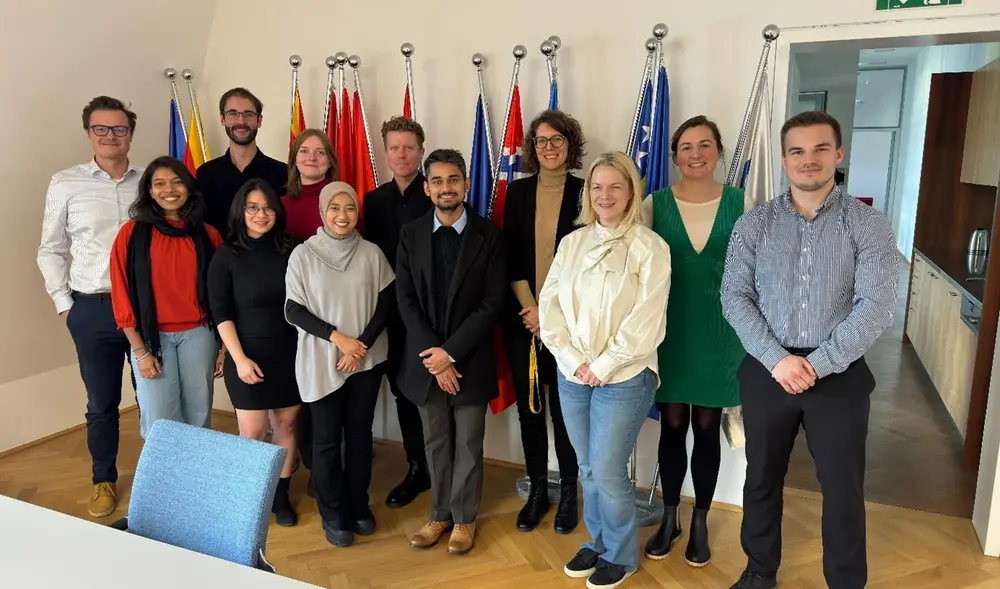
The third semester students at Brandt School this year are working with a number of interesting organizations in the form of project groups. Project group ‘Transformative Leadership’ and ‘Designing a future multi-donor fund for de-risking and greening investments in Ukraine under the Energy Community’ had a kickstart to their work from trips respectively to Berlin and Vienna. Omar Ali and Aditi Tyagi discuss their experience in their project excursion trips.
Transformative Leadership
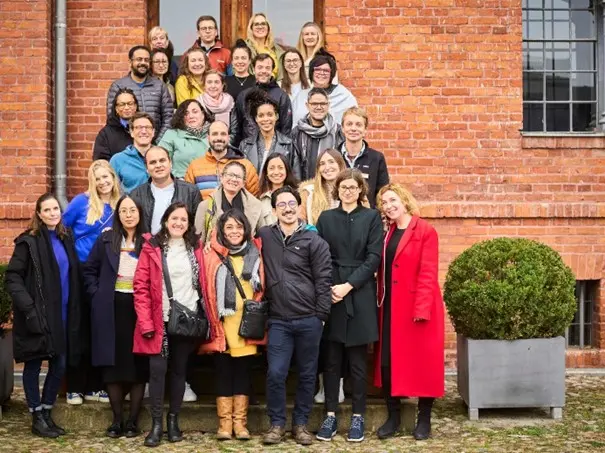
The BMW Foundation started on a transformative journey with the Presencing Institute to create inclusive leadership paradigms for a more equitable and regenerative future. This ambitious project, which will last 3-5 years, aims to bring together diverse stakeholders who are currently working on these fronts to identify synergies, underutilized resources, and possible collaborations. The initiative, which began in 2022 because of the discovery that other organizations were working independently, has evolved into a systematic strategy incorporating leadership organizations, system thinkers, and transformative leaders. The primary goal of the group is for participants to have the same purpose, vision, and values. The current focus is on relational infrastructure, which is a framework that includes social connections, interactions, and collective intelligence to improve collaboration, problem-solving, and change activities.
The Willy Brandt School of Public Policy is playing an important role in the second phase of the project, as an external sponsor, actively engaged in collaborative projects with the BMW Foundation. A dedicated cohort of Willy Brandt School students recently traveled to Berlin under the supervision of Professor Grimm, the institution's Vice Director. The main goal of this excursion was to take part in a precisely planned three-day event hosted by the BMW Foundation. This strategic meeting was a watershed moment in the project, acting as a platform for stakeholders to come together, exchange ideas, and lay the groundwork for later transformative processes.
The gathering brought together a varied and influential group of institutions, facilitating collaboration and the sharing of ideas. Participants included the Together Institute, Blavatnik School of Government at the University of Oxford, B-Team, Faireshare of Women Leaders, Presencing Institute, Atlantic Council, Collective Change Lab, Bramble Group, leaders from various fields, Ulex - Leaderful Organising, Systems Sanctuary, Novartis, IAC, IREX, Bill & Melinda Gates Foundation, B Lab, Fundacion Origen, Sistema B, Columbia University, Inner Development Goals, Turtle Island Institute, and the Transformational Leadership Institute. A deliberate blend of indoor and outdoor activities was thoughtfully designed to fulfill diverse purposes during the meeting. Indoor sessions provided a forum for in-depth conversations and dialogues, allowing participants to gain a better knowledge of their own perspectives, visions, and expectations. Outdoor activities were skillfully weaved into the agenda at the same time, serving as accelerators for relationship-building and teamwork.
The gathering's varied range of activities served numerous purposes. Some activities emphasized the development of interpersonal bonds, allowing participants to get to know one another on a more personal level. Others aimed at visualizing shared interests and harmonizing the members' joint aims and objectives. Furthermore, conversations on how to effectively collaborate and plan the project's next steps were essential components of the gathering. The gathering's main accomplishment was the formation of a strong Community of Practice for Transformative Leadership. Players took on various responsibilities within this community, embodying three important positions: friends establishing relationships, active players contributing energetically, and fire keepers or stewards leading the group with determination.
As a member of the remarkable group of Willy Brandt School students, I had the distinction of actively participating in the Berlin gathering. I was immediately engaged in a dynamic environment pulsating with intellectual fire and passion when I arrived at the gathering in Berlin. The stakeholders' different backgrounds, which included academics, business programs, civic society, system thinkers, and transformative leaders, resulted in a rich tapestry of ideas.
The eye-opening experience was a unique platform for collaborative leadership to contribute to the construction of a more just and regenerative future. The combination of academic rigor, various perspectives, and a common commitment to transformative leadership has left a lasting impression on my professional and personal outlook. As we progress, the prospect of seeing the actual results of our collective endeavor fills me with pride and a renewed sense of purpose. Finally, my heartfelt gratitude goes to the project's organizers and participants.
Designing a future multi-donor fund for de-risking and greening investments in Ukraine under the Energy Community
On a chilly morning, our group gathered at the Hauptbahnhof, ready to embark on our journey to Vienna. Despite Deutsche Bahn's habitual deviation from German punctuality norms, we found ourselves engrossed in strategic discussions about our upcoming presentation and client meeting.
Our client is The Energy Community, an international organization that unites the European Union and its neighboring nations in the creation of a cohesive pan-European energy market. Established by the Treaty signed in October 2005 in Athens, Greece, and enforced since July 2006, the Energy Community operates with the primary goal of extending the rules and principles of the EU internal energy market to countries in South East Europe, the Black Sea region, and beyond. This extension is achieved through a legally binding framework, shaping the energy landscape in accordance with shared standards.
Having arrived in Vienna and gathered for a delightful traditional Austrian dinner, we prepared ourselves for the upcoming day. Our engagement at the Energy Community involved meetings with legal experts from diverse fields, including a valuable interaction with Dirk Buschle, the Deputy Director. During this session, Mr. Buschle provided insights into the project and outlined the expectations his team had for our contribution.
The focal point of the project centered on the management of a fund designed to rebuild the Ukrainian energy and manufacturing industry. In support of Ukraine, the Energy Community had successfully raised approximately 250 million euros, earmarked for addressing the most pressing needs of Ukrainian energy companies. Our encounter with the Energy Community team proved to be a rich source of information, with discussions that were both intriguing and mutually beneficial.
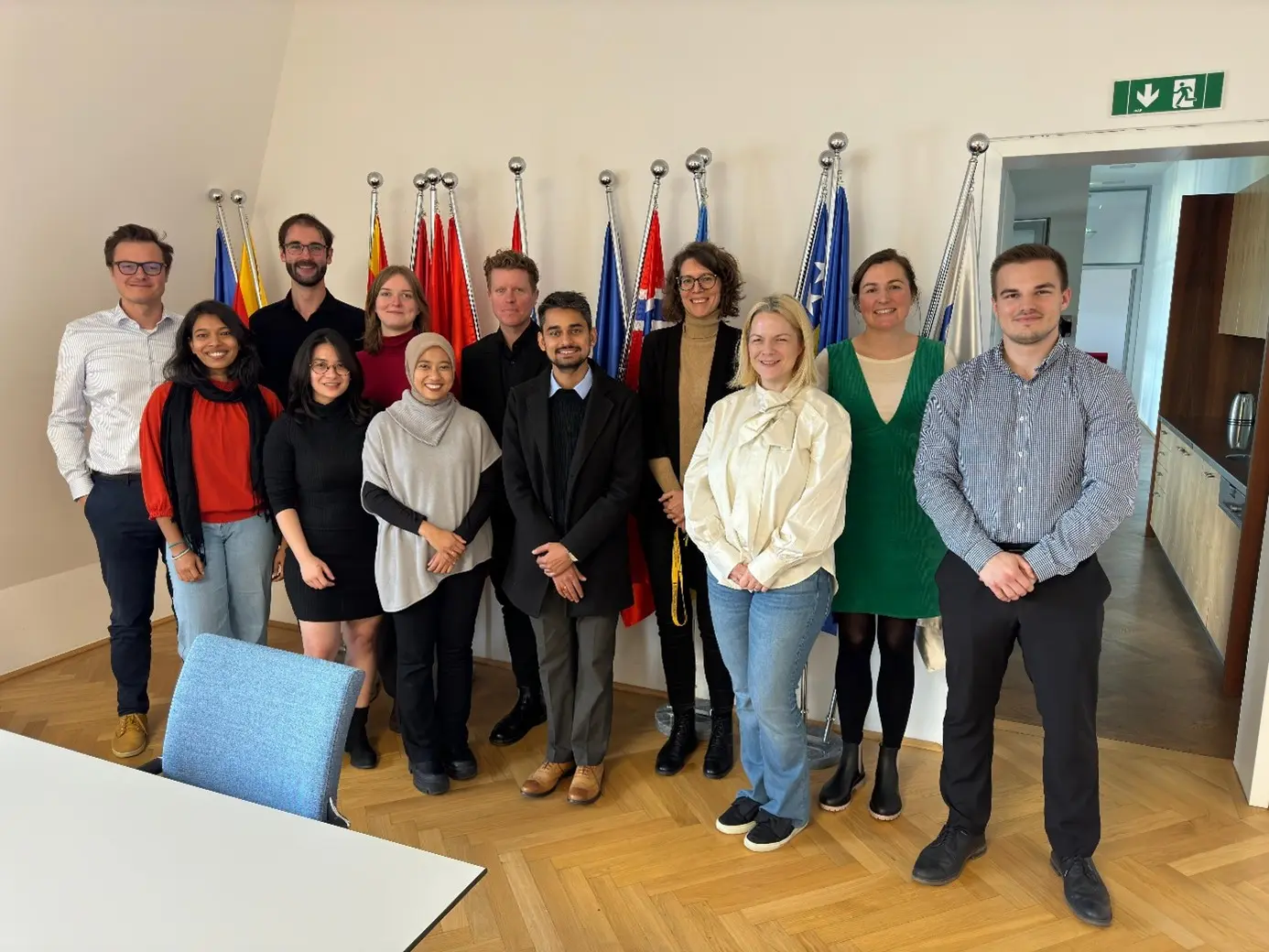
Following our engagements at the Energy Community, we had the privilege of meeting with Daniel Kroos, an expert affiliated with Sustainable Energy for All (SEforAll). Mr. Kroos generously shared his wealth of experiences in the field, which extended beyond the logistical aspects, delving into the nuanced considerations and diverse perspectives crucial for navigating such a complex endeavor. This encounter with Mr. Kroos not only enriched our understanding but also provided practical wisdom essential for our role in the ongoing project.
On the subsequent day, we ventured to the United Nations Industrial Development Organization (UNIDO) with the objective of deepening our on-the-ground understanding of the situation in Ukraine. A diverse panel of Ukraine and industry experts led discussions spanning from the intricacies of industrial policies and their challenges to the imperative of green energy transition and the principles of a circular economy.
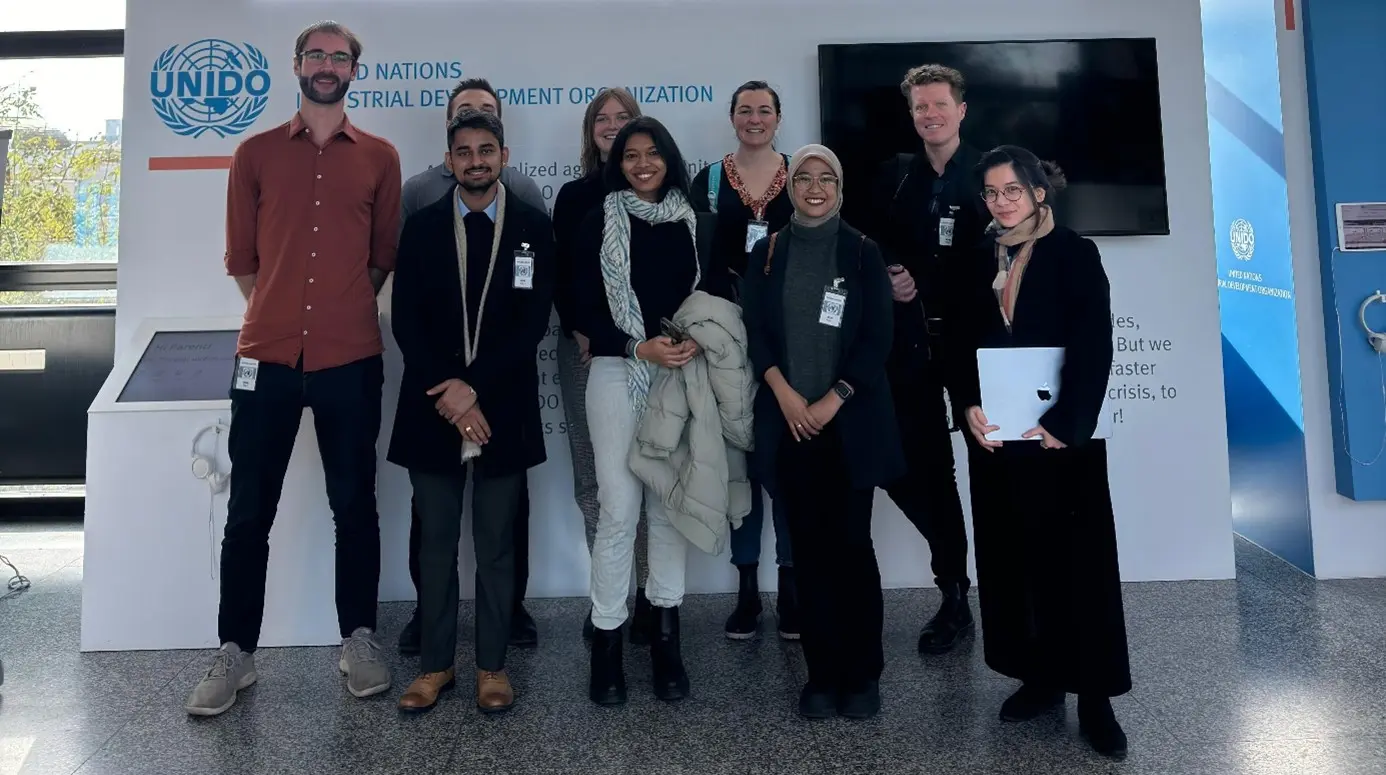
The discourse further extended to a poignant examination of the current situation in Ukraine, shedding light on the vital role played by multi-donor funds and the collaborative efforts with other organizations. This immersive experience at UNIDO not only broadened our knowledge base but also provided a holistic perspective essential for formulating effective strategies in our ongoing endeavors.
Subsequently, for our culminating session, we headed to the Central European University, where we held discussions with esteemed professors around the pivotal role of public finance and economic transformations in shaping the future trajectory of Ukraine. The interdisciplinary nature of the dialogue allowed us to glean multifaceted perspectives on the complex challenges and opportunities facing the country. Adding a layer of authenticity to the academic discourse, we were privileged to be joined by two Ukrainian students currently enrolled at CEU. Their personal insights provided a nuanced and firsthand understanding of the matters at hand, offering a valuable complement to the theoretical frameworks presented by the professors.
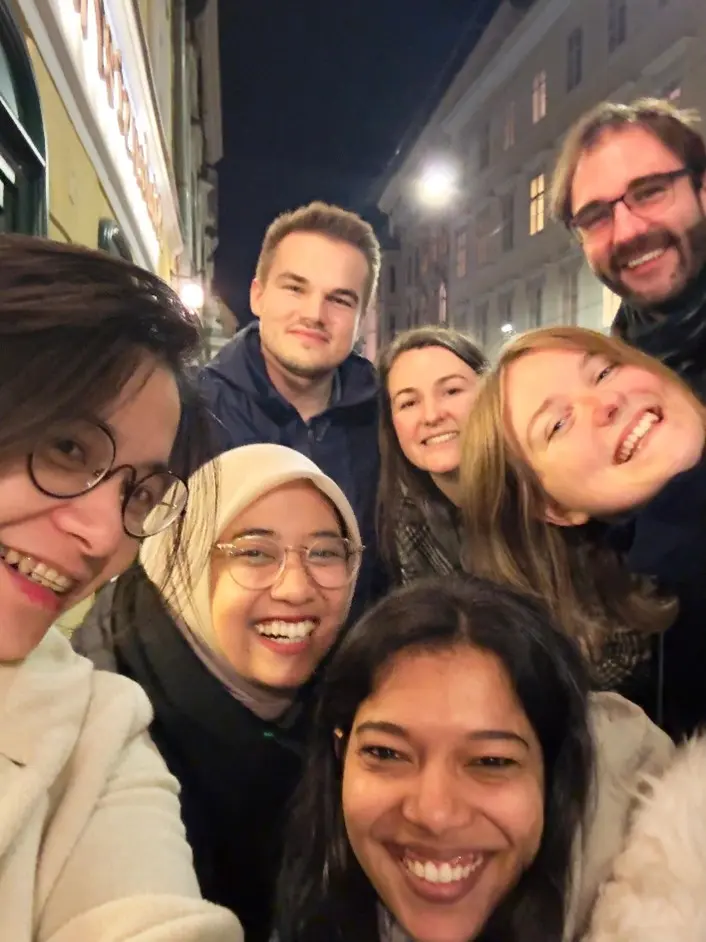
Concluding two days filled with intense learning and absorbing experiences, we brought our journey to a close with a visit to the enchanting Schönbrunn Palace in Vienna. The invaluable insights gained from engaging with experts, exploring the vibrant city of Vienna, and delving into complex topics have etched an indelible mark. Gratitude fills me for the privilege of experiencing this enriching journey and being a part of a transformative process that will resonate long after the trip's conclusion.
About the Author
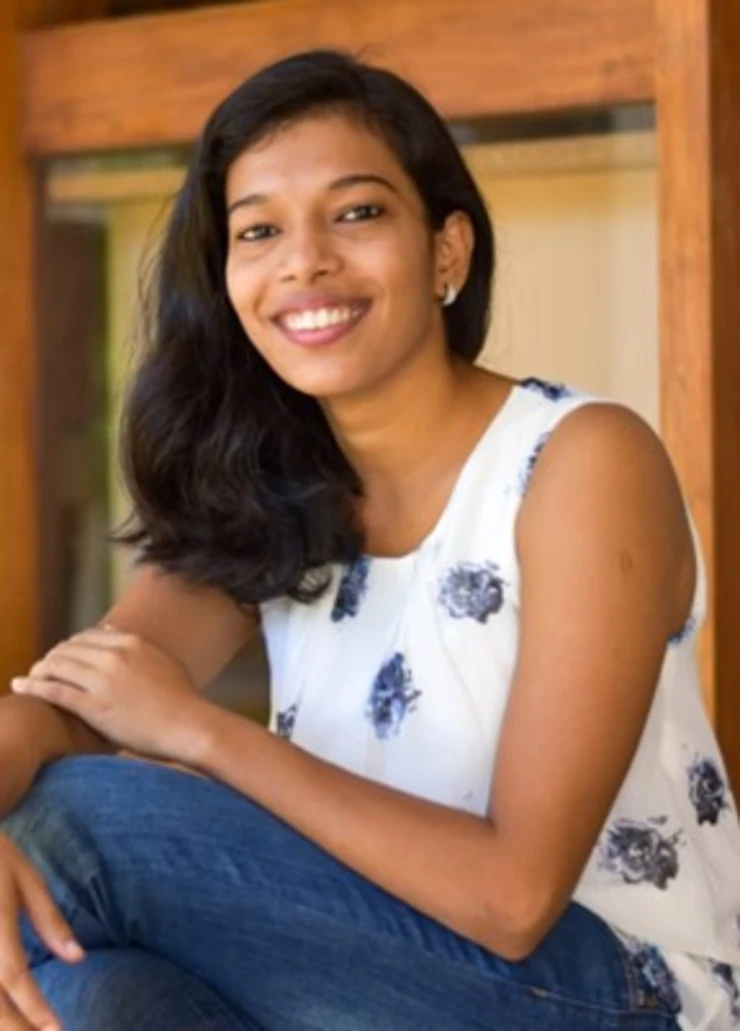
Aditi Tyagi is a MPP student at the Willy Brandt School of Public Policy. Aditi's area of interest are energy policy and transition. Previously, Aditi has worked in the fields of education and animal welfare.
~ The views represented in this blog post do not necessarily represent those of the Brandt School. ~